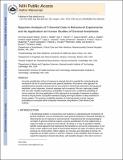| dc.contributor.author | Purdon, Patrick Lee | |
| dc.contributor.author | Brown, Emery N. | |
| dc.contributor.author | Wong, Kin Foon Kevin | |
| dc.contributor.author | Smith, Anne C. | |
| dc.contributor.author | Pierce, Eric T. | |
| dc.contributor.author | Harrell, P. Grace | |
| dc.contributor.author | Walsh, John L. | |
| dc.contributor.author | Salazar, Andres Felipe | |
| dc.contributor.author | Tavares, Casie L. | |
| dc.contributor.author | Cimenser, Aylin | |
| dc.contributor.author | Prerau, Michael J. | |
| dc.contributor.author | Mukamel, Eran A. | |
| dc.contributor.author | Sampson, Aaron | |
| dc.date.accessioned | 2014-05-01T14:31:04Z | |
| dc.date.available | 2014-05-01T14:31:04Z | |
| dc.date.issued | 2011-08 | |
| dc.date.submitted | 2011-06 | |
| dc.identifier.isbn | 978-1-4577-1589-1 | |
| dc.identifier.isbn | 978-1-4244-4121-1 | |
| dc.identifier.isbn | 978-1-4244-4122-8 | |
| dc.identifier.uri | http://hdl.handle.net/1721.1/86320 | |
| dc.description.abstract | Accurate quantification of loss of response to external stimuli is essential for understanding the mechanisms of loss of consciousness under general anesthesia. We present a new approach for quantifying three possible outcomes that are encountered in behavioral experiments during general anesthesia: correct responses, incorrect responses and no response. We use a state-space model with two state variables representing a probability of response and a conditional probability of correct response. We show applications of this approach to an example of responses to auditory stimuli at varying levels of propofol anesthesia ranging from light sedation to deep anesthesia in human subjects. The posterior probability densities of model parameters and the response probability are computed within a Bayesian framework using Markov Chain Monte Carlo methods. | en_US |
| dc.description.sponsorship | National Institutes of Health (U.S.) (Grant DP2-OD006454) | en_US |
| dc.description.sponsorship | National Institutes of Health (U.S.) (Grant K25-NS057580) | en_US |
| dc.description.sponsorship | National Institutes of Health (U.S.) (Grant DP1-OD003646) | en_US |
| dc.description.sponsorship | National Institutes of Health (U.S.) (Grant R01-EB006385) | en_US |
| dc.description.sponsorship | National Institutes of Health (U.S.) (Grant R01-MH071847) | en_US |
| dc.language.iso | en_US | |
| dc.publisher | Institute of Electrical and Electronics Engineers (IEEE) | en_US |
| dc.relation.isversionof | http://dx.doi.org/10.1109/IEMBS.2011.6091165 | en_US |
| dc.rights | Creative Commons Attribution-Noncommercial-Share Alike | en_US |
| dc.rights.uri | http://creativecommons.org/licenses/by-nc-sa/4.0/ | en_US |
| dc.source | PMC | en_US |
| dc.title | Bayesian analysis of trinomial data in behavioral experiments and its application to human studies of general anesthesia | en_US |
| dc.type | Article | en_US |
| dc.identifier.citation | Wong, K. F. K., A. C. Smith, E. T. Pierce, P. G. Harrell, J. L. Walsh, A. F. Salazar, C. L. Tavares, et al. “Bayesian Analysis of Trinomial Data in Behavioral Experiments and Its Application to Human Studies of General Anesthesia.” 2011 Annual International Conference of the IEEE Engineering in Medicine and Biology Society (n.d.). | en_US |
| dc.contributor.department | Harvard University--MIT Division of Health Sciences and Technology | en_US |
| dc.contributor.department | Massachusetts Institute of Technology. Department of Brain and Cognitive Sciences | en_US |
| dc.contributor.mitauthor | Purdon, Patrick Lee | en_US |
| dc.contributor.mitauthor | Brown, Emery N. | en_US |
| dc.relation.journal | Proceedings of the 2011 Annual International Conference of the IEEE Engineering in Medicine and Biology Society | en_US |
| dc.eprint.version | Author's final manuscript | en_US |
| dc.type.uri | http://purl.org/eprint/type/ConferencePaper | en_US |
| eprint.status | http://purl.org/eprint/status/PeerReviewed | en_US |
| dspace.orderedauthors | Wong, K. F. K.; Smith, A. C.; Pierce, E. T.; Harrell, P. G.; Walsh, J. L.; Salazar, A. F.; Tavares, C. L.; Cimenser, A.; Prerau, M. J.; Mukamel, E. A.; Sampson, A.; Purdon, P. L.; Brown, E. N. | en_US |
| dc.identifier.orcid | https://orcid.org/0000-0001-5651-5060 | |
| dc.identifier.orcid | https://orcid.org/0000-0003-2668-7819 | |
| mit.license | OPEN_ACCESS_POLICY | en_US |
| mit.metadata.status | Complete | |
